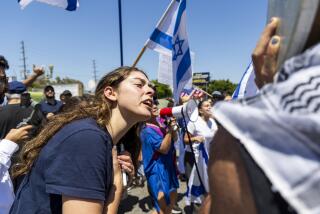Muslims Gather to Mark End of Ramadan
- Share via
Beneath the gleaming blue minaret of the new King Fahd Mosque that towers over Washington Boulevard in Culver City, more than 1,200 Muslims gathered Friday to celebrate Eid al-Fitr, the joyful festival marking the end of the holy month of Ramadan.
At the morning Eid service, Muslim men in flowing robes and women wearing bright, colorful hijabs over their heads prostrated themselves in prayer under the mosque’s grand dome. Eid al-Fitr is one of Islam’s holiest days and breaks the monthlong period of fasting and self-restraint observed by all Muslims during Ramadan. After the service, friends laughed, embraced and exchanged good wishes for the coming year.
“This is the day Muslims rejoice because we have all fasted and prayed and we feel a sense of accomplishment. People get together. Children sometimes receive gifts. And of course, we eat. We consume so much food we gain back all the weight we lost during Ramadan,” said Usman Madha, a community liaison for the King Fahd Mosque.
Ramzi Ben Youssef, who is originally from Tunisia, added, “Fasting [from sunrise to sunset] during Ramadan is more than just abstaining from food. It’s about cleansing your soul.”
The Culver City gathering at the King Fahd Mosque attracted Muslims from Los Angeles and Orange counties and reflected the immense diversity of Southern California’s surging Muslim community. The assembly included immigrants from Saudi Arabia, Brazil, Burma, Bangladesh, Pakistan, Turkey, Algeria, India and a significant number of devout newcomers from the African regions of Ghana, Sudan and Somalia.
The lavish, $8.1-million marble mosque, which was funded completely by King Fahd and the Saudi Arabian royal family, has been open for four months and has already become a focal point for the more than 250,000 Muslims in Los Angeles County.
Like many other Muslims who attended Eid observances at the mosque, Siddiga Gurashi said that despite their different nationalities, they feel a spiritual connection at prayer.
“You come and you will hear hundreds of languages from across the world. And it’s wonderful because even if we don’t understand each other, there is one thing that ties us together: Islam,” she said.
There are about 75 Islamic centers in Southern California, most in old bank buildings or government properties. Yet, there were only three true masjids, or mosques, in Los Angeles, that were built from scratch and designed with the grand domes and minarets that are characteristic of Islamic architecture. The King Fahd Mosque is the fourth structure.
With its 79-foot-tall minaret and double domes, the King Fahd Mosque has already become a landmark on the Westside. Intricate blue tile work imported from Turkey adorns the pillars leading into the entrance. Inside, plush carpets from Saudi Arabia are laid across the marble prayer hall and verses from the Koran, painted by a team of Turkish artists, adorn the walls and ceiling. Women are seated in a spacious prayer balcony separated from the men, as is mandated by the Muslim faith.
The King Fahd Mosque was dedicated in July 1998 by Saudi Prince Abdul Aziz, but stood empty for more than a year during a dispute with the city over several issues.
Tajuddin Shuaib, imam of the mosque, said several residents complained that the mosque would create traffic in the area. Others opposed the elaborate architectural structure, saying that glare from the marble would cause traffic accidents. The mosque is currently functioning with a temporary operating certificate until its kitchen and dining area are completed.
“The opposition was strong,” said Shuaib. “But, now that we are open, all the fear seems to be gone.”
Drawn by the striking sight, even non-Muslims have begun entering the King Fahd Mosque, curious about what grandeur lies within. Recently, a group of high school students from Redondo Beach came to visit. The League of Women Voters has selected the mosque as the site for its monthly meetings. Shuaib said the board of directors that oversees the mosque is considering a program of tours.
“The King Fahd Mosque has a gravity that pulls people into it. People see it and they say, ‘Wow, what’s this?’ ” he said. “We not only see the mosque as a place for prayer, marriage and death. Now, we have to deal with non-Muslims who see it as a work of art.”
At Eid services, Shuaib reiterated the often stated hope of countering U.S. stereotypes of Muslims as fundamentalists and terrorists. Reflecting on last month’s arrests of two Algerian terrorism suspects in New York and Seattle, Shuaib said Muslims who endorse violence have turned away from the Muslim holy book, the Koran.
“We are not taking part in any politics. We’re not here to attack anyone. We are here to dispense mercy, love, and caring. Our mission is exclusively Islam,” he said.
More to Read
Sign up for Essential California
The most important California stories and recommendations in your inbox every morning.
You may occasionally receive promotional content from the Los Angeles Times.













